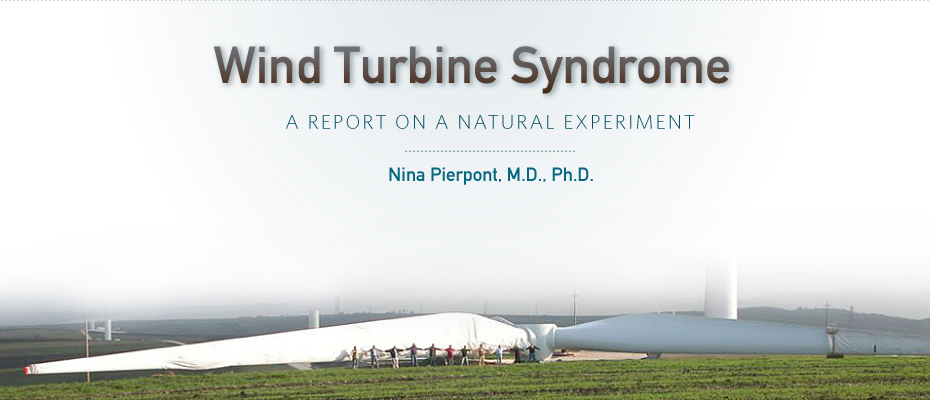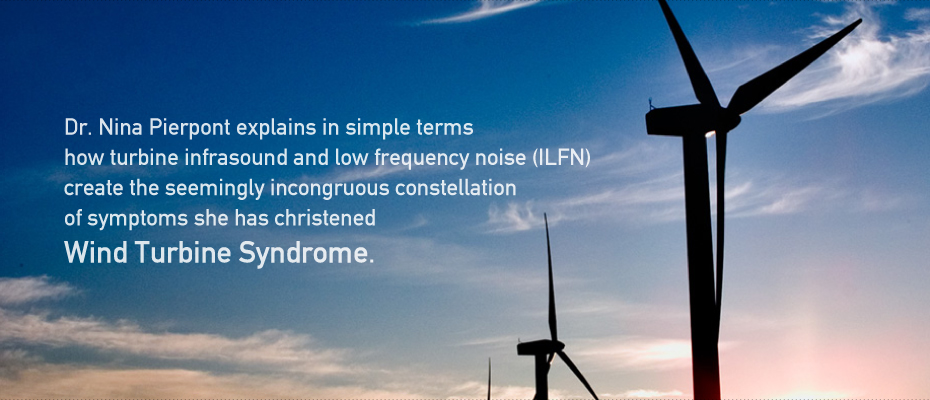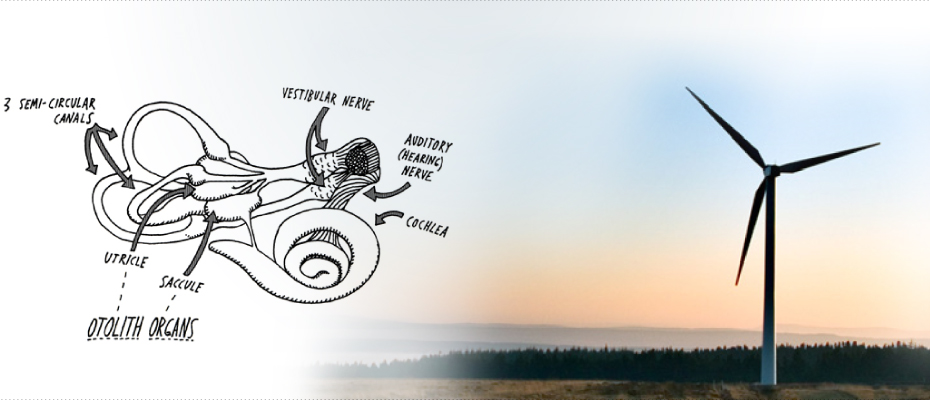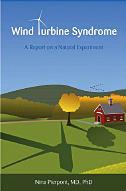Wind Turbine Syndrome
A Report on a Natural Experiment
a book by Nina Pierpont
Wind energy is a multi-billion dollar a year industry. It’s billed as “clean, green, renewable.” In this engagingly written, peer-reviewed report by a Johns Hopkins University School of Medicine-trained M.D. and Princeton (Population Biology) Ph.D., we discover wind energy’s dirty little secret.
Many people living within 2 km (1.25 miles) of these spinning giants get sick. So sick that they often abandon (as in, lock the door and leave) their homes. Nobody wants to buy their acoustically toxic homes. The “lucky ones” get quietly bought out by the wind developers—who steadfastly refuse to acknowledge that Wind Turbine Syndrome exists. (And yet the wind developers thoughtfully include a confidentiality clause in the sales agreement, forbidding their victim from discussing the matter further.)
Dr. Nina Pierpont explains in simple, layman’s terms how turbine infrasound and low frequency noise (ILFN) create the seemingly incongruous constellation of symptoms she has christened Wind Turbine Syndrome. (Incongruous only to the non-clinician who does not understand Mother Nature’s organs of balance, motion, and position sense.) For the high level clinician, Pierpont provides a parallel chapter written in sophisticated medical language and format, complete with voluminous, up-to-date clinical and scientific references.
The core of the book is 66 pages of ingeniously laid out tables wherein the author presents her clinical Case Histories. The hard data.
Since publishing the book in late 2009, Pierpont has heard from people around the world who are discovering that Wind Turbine Syndrome is not confined to living in the shadow of industrial wind turbines. It turns out people suffer identical symptoms from living close to natural gas compressor stations, industrial sewage pumping stations, industrial air conditioners, and other power plants. In each case, low frequency noise and infrasound appear to be the chief disease-causing culprit—basically, Wind Turbine Syndrome without the turbines.
Click here to read about the author, Nina Pierpont
Click here to download sample pages
Impressive. Interesting. And important.”
—ROBERT M. MAY, PhD, Professor Lord May of Oxford OM AC Kt FRS. President of the Royal Society (2000–05), Chief Scientific Advisor to the UK government (1995–2000).
Dr. Pierpont has clinically defined a new group of human subjects who respond to low frequency, relatively high amplitude forces acting upon the sensory and other body systems. Her rigorous clinical observations are consistent with reports of the deleterious effects of infrasound on humans.”
—F. OWEN BLACK, MD, FACS, Senior Scientist and Director of Neuro-Otology Research, Legacy Health System, Portland, Oregon. Dr. Black is widely considered to be one of the foremost balance, spatial orientation, and equilibrium clinical researchers in America.
This is an extraordinary book. It is personal and passionate, which makes it compelling reading. But it is much more—authoritative, meticulous, and scholarly. . . . It clearly takes its place as the leading work on the topic. . . . A must-read for all health care professionals.”
—ROBERT Y. McMURTRY, MD, FRCS (C), FACS. Former Dean of Medicine and Dentistry at the Schulich School of Medicine & Dentistry, University of Western Ontario. Founding Assistant Deputy Minister of the Population and Public Health Branch of Health Canada, and currently a member of the Health Council of Canada.
Dr. Pierpont has written a superb and powerful book. Truly first-rate in its presentation of hard data, and with remarkable clarity. I devoutly hope that her findings, pinned as they are to unassailable research and rigorously peer-reviewed by ranking scientists, come to the attention of movers and shakers who can broaden the research base and shape the politics of dealing with Wind Turbine Syndrome.”
—JACK G. GOELLNER, Director Emeritus, The Johns Hopkins University Press (America’s oldest university press, founded 1878).
Dr. Pierpont has made an important contribution to a debate about wind turbines that should be conducted not between champions and opponents of renewable energy, but within the community of those who want this country to behave in an environmentally responsible way. That we can and should do.”
—EDITORIAL BOARD OF THE INDEPENDENT (UK), August 2, 2009





